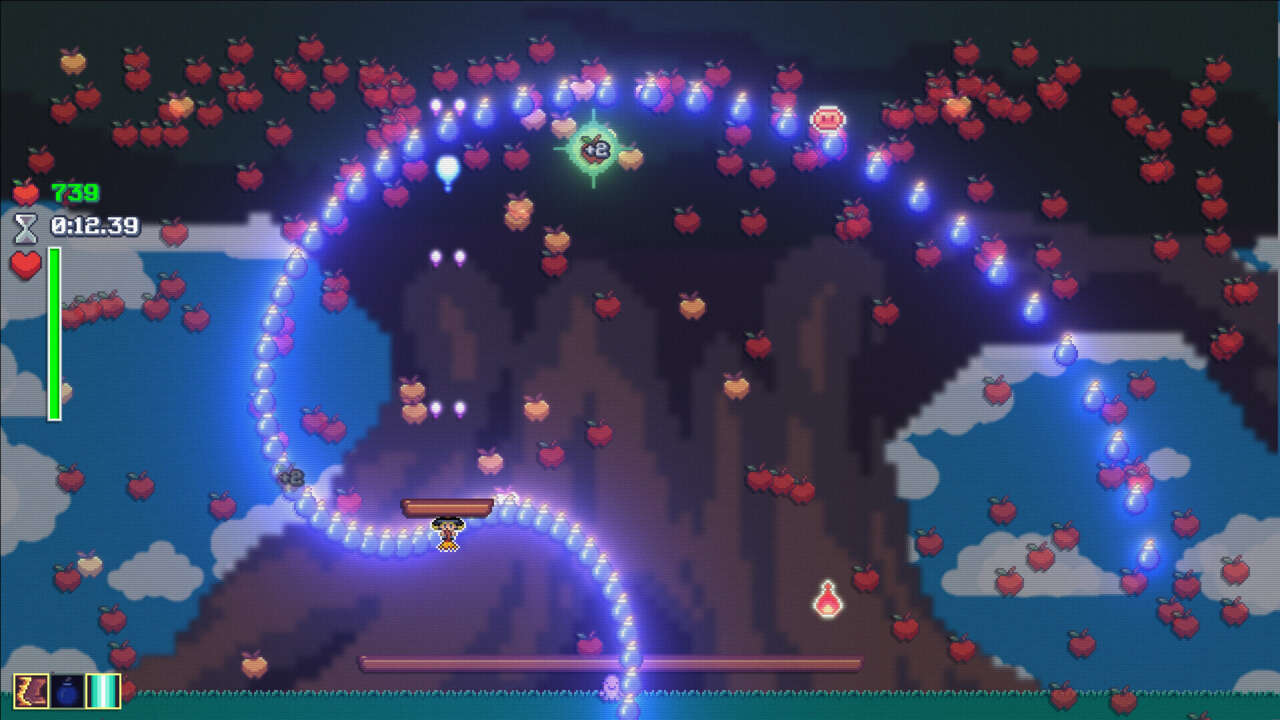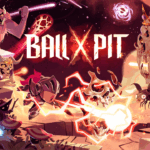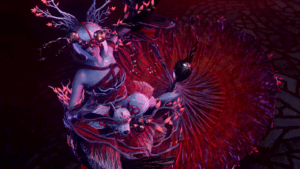It’s difficult to describe Cauldron. Or, more accurately, it’s difficult to explain just one of its systems in a vacuum, to accurately convey the intermingling of systems that has dominated my gaming attention lately. Every piece is so interconnected and each one sings on its own, but it’s really the harmony of them all together that makes it special. Like the Cauldron itself, you can throw a bunch of ingredients into a big pot, and what comes out is magical.
At its most basic, Cauldron presents itself like an idle minigame collection. You start in a fairly small plot of land, surrounded by darkness, and you have access to three minigames: apple-collecting, fishing, and mining. As you explore each game, you start an automated counter that gathers materials for you, while also obtaining them manually by playing the minigames. The more apples you have, the more you can buy upgrades to the apple collecting minigame, and so on. You’re lightly encouraged to hop from minigame to minigame, each one lasting only a minute or two, gathering materials and letting them passively gather for you, to slowly start upgrading.
But then you notice that when you press up against the edges of the darkness, it prompts a classic turn-based RPG to fight monsters and uncover more land. You can fight the monsters or you can bribe them to clear out of the area using the resources you’ve gathered. As you explore the land uncovered by darkness, you unlock new party members, who can be played manually or given automations. As you feed more materials into the cauldron your characters get more powerful, making for an interesting push-pull dynamic: Do you pay for upgrades to the minigames or to upgrade your party members? Juggling this back and forth is a key part of the game, assuring you never quite run out of things to do.
Then, before your eyes, the minigames themselves start changing–first subtly, then so suddenly and radically that they become completely different genres. The apple-collecting minigame for example, starts fairly simply: You hold a basket and move back and forth collecting apples falling from trees. One of the first upgrades gives your sidekick his own basket to double your productivity. You get a fireball upgrade to blast the bad apples that detract from your score, and then monsters start to show up, so the fireballs work on them too. Before long, you get the ability to float around freely instead of merely back and forth. Your companion’s basket gets so large that it covers the entire bottom screen and you no longer even need your own basket. Instead, now you’re focused on aiming your fireballs. The bad apples become the fuel for upgradable turrets. Your fireballs become more rapid. After a few more upgrades, this simple apple-collecting minigame has turned into a frantic bullet-hell shooter, and you got to see every incremental step along the way that transformed it. It’s a pretty incredible trick.
As you extend your reach even further into the darkness, the pace of your automated gathering quickens and the economy changes. Soon you’re no longer paying 5 or 10 doodads for an upgrade, but 5 or 10 million, billion, or trillion. It satisfies the classic clicker formula without really being a clicker. Number go up.
Also as you extend your reach further into the darkness, you discover even more minigames. Uh oh. Two of them, including one Vampire Survivors-like, introduce even more resources to gather and their own upgrade trees. Others are puzzle or exploration challenges or a combat arena that grant you Spirit power to pay for permanent upgrades to all your party members. That makes your characters more powerful, which means they can take on even harder challenges, to uncover more darkness, to get more resources, to pay for better upgrades, to further iterate and transform the minigames.
I feel like I’ve barely scratched the surface of Cauldron. I know from some of the menus and reading up on the game that I’m only in the first default game mode, and that more modes with special conditions will unlock once I’ve finished it. Those modes then introduce further wrinkles to the minigames. I could see myself getting sucked in over and over to complete all the modes with specialized win conditions like Pacifism, in which you can’t battle the monsters only–only bribe them.
Cauldron is the kind of surprising game I love, a treat that comes out of nowhere and suddenly occupies your mind and your gaming time, and one that feels tailor-made for playing while traveling or catching up with TV shows on your Steam Deck. It has cast a spell on me, and if you give it a little time, you’ll get hexed too.
Disclosure: GameSpot and Fanatical are both owned by Fandom.









